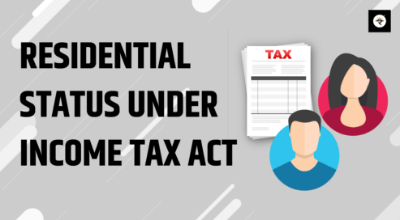Taxation of individuals in India is primarily based on their residential status in India for a particular financial year. The phrase “residential status” was coined under India’s income tax rules and should not be confused with citizenship.
Let’s say a person is a resident of India but he has left the country for some reason that can be for employment or for any specific reason so how can we determine his residential status?
An individual may be an Indian citizen but become a non-resident for a certain year. Similarly, a foreign citizen may become a resident of India for income tax purposes in a given year.
For, better understanding of this, Income tax Act defines specific criteria for determining the residential status of an individual for income tax purposes.
Income tax law has bifurcated the residential status of an individual in India into three categories based on the number of days taxpayer has lived in India.
- Resident and Ordinarily Resident (ROR) :
A taxpayer would qualify as a resident of India if he satisfies one of the following 2 conditions:
- His stay in India is 182 days or more in previous year or
- His stay in India for immediately 4 years preceding the previous year is 365 days or more and 60 days or more in the previous financial year.
- Deemed Resident
An individual who is a citizen of India having a total income other than income from foreign sources exceeding 15 lakhs during the previous year would be considered as a deemed resident in India if he is not liable to tax in any other countries by reason of his residence or domicile. A deemed resident will be considered as a resident but not ordinarily resident (RNOR) by default.
- Non-resident (NR)
An individual failing to satisfy the condition of stay in India for:
- 182 days or more in the previous year or
- 60 days or more in the previous year and 365 days in the 4 years preceding previous years
Will be considered as a Non-Resident for that financial year.
Exceptions to Residential Status
- In the event an individual who is a citizen of India leaves India as a member of the crew of an Indian ship or for the purpose of employment during the FY, he will qualify as a resident of India only if he stays in India for 182 days or more.
- Indian citizen or person of Indian origin who stays outside India comes on a visit to India during the relevant previous year, he will qualify as a resident of India only if he stays in India for 182 days or more
- However, if such a person having a total income, other than the income from foreign sources exceeds Rs.15 lakhs during the previous year will be treated as a resident in India if –
- He stays in India during the relevant previous year for 182 days or more, or
- He stayed in India for 365 days or more during the previous 4 years and has been in India for at least 120 days in the previous year.
How can you manage your residential status in order to save taxes:
- In case you are working in India and have an opportunity to work outside India and your stay is India is just around that 182-day mark, you can book your flights to the foreign country accordingly with some lay overs or maybe leaving India a couple of days early to ensure that your residential status is non-resident for that year.
Things which a non-resident should consider while planning for Indian taxes:
- There is only one document which can prove your residential status and that is your passport, many a times when you renew the passport the copy of the old passport is not handled properly and can get misplaced, for such cases, it is advisable that you maintain a soft copy of the old passport.
There is certain conditions where an individual can be RNOR, but, this residential status is very rarely observed apart from the one mentioned in the above scenario and hence the same has not been covered in too much detail.



<a href=https://newkulinarki.xyz/>Каталог newkulinarki.xyz</a>
<a href=https://newkulinarki.xyz/>Каталог кулінарних рецептів</a>
<a href=https://domodomiknash.xyz/>Сайт domodomiknash.xyz</a>